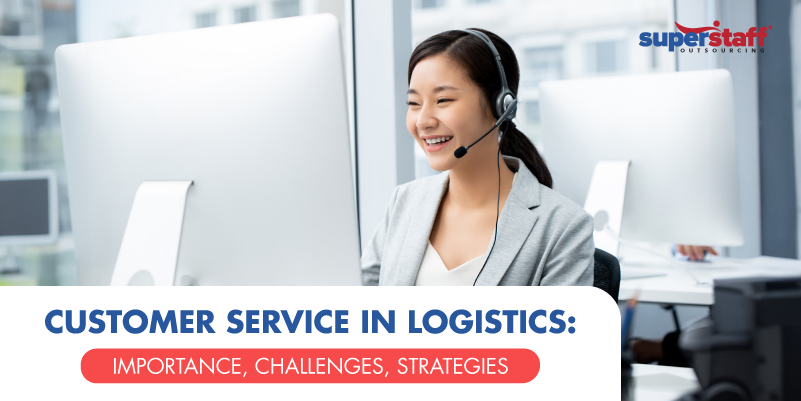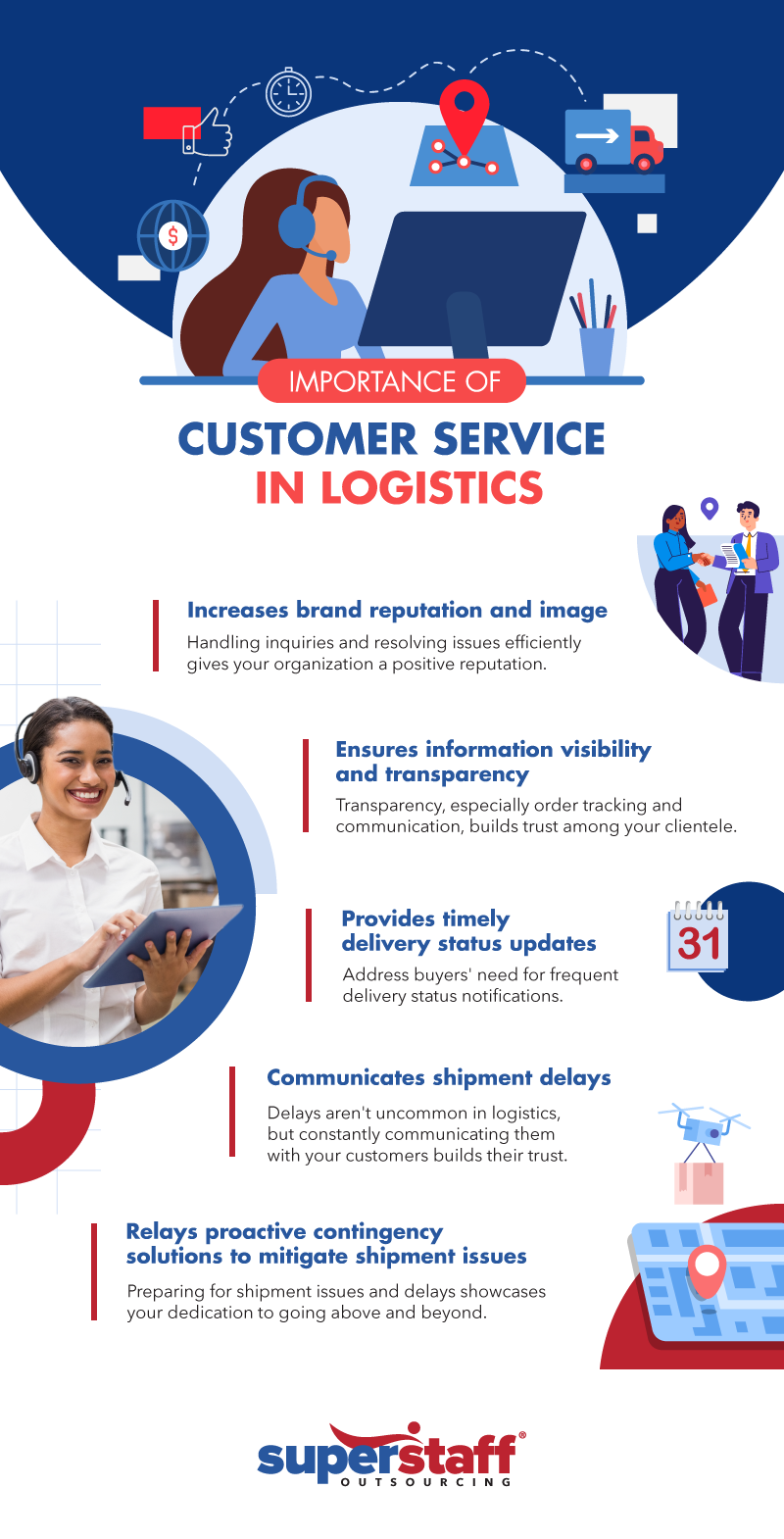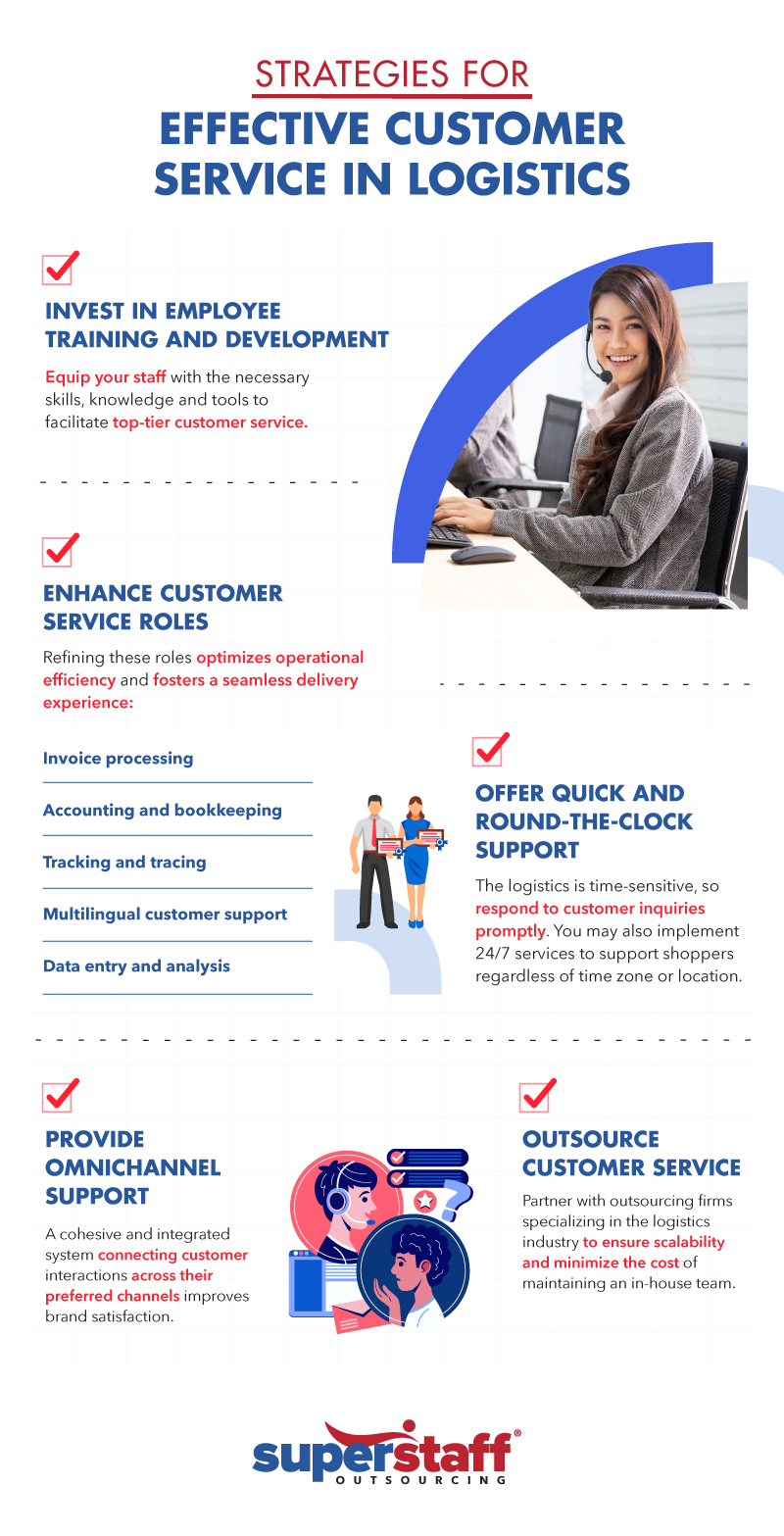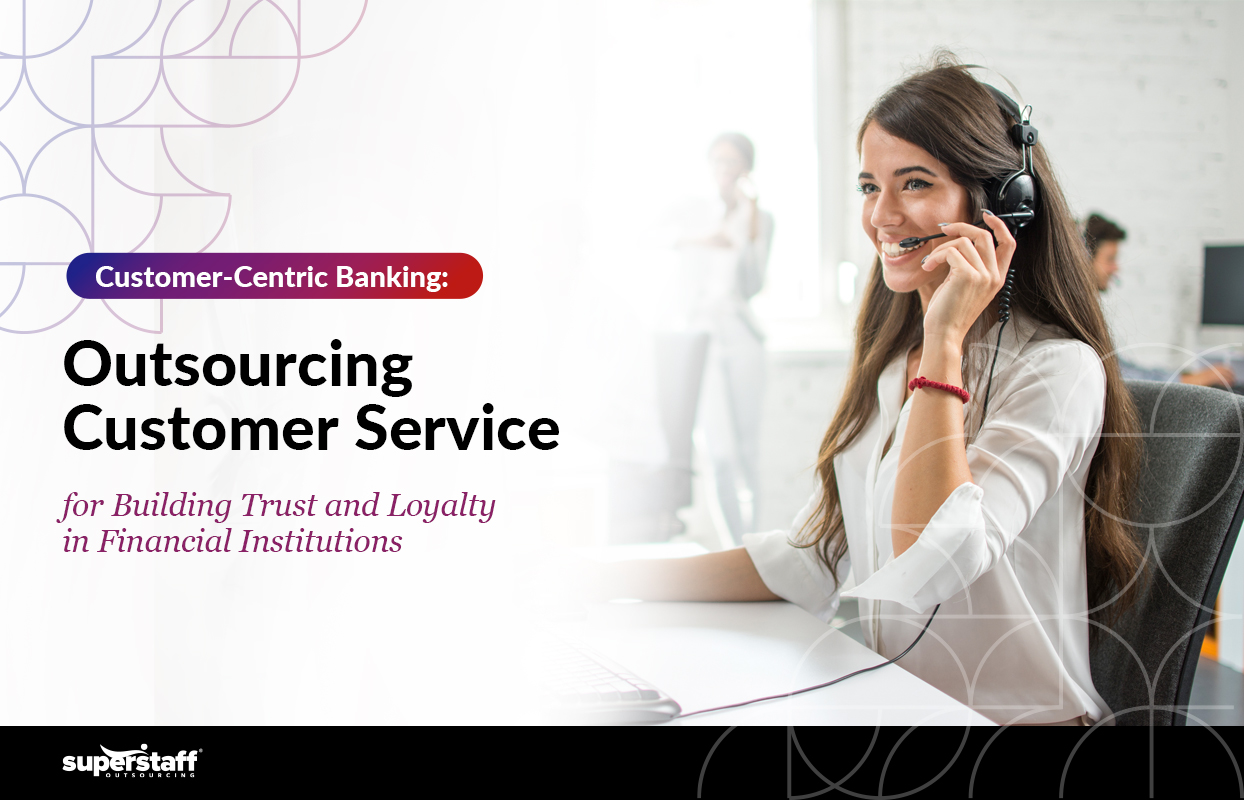
Customer service plays a critical role in your logistics business. As you navigate supply chains and transportation networks, addressing customer needs becomes a defining factor for your operations. After all, satisfied buyers are more than clientele — they often translate into repeat buyers and advocates who recommend your products and services, making them an invaluable asset to your brand.
Unfortunately, logistics customer service is not immune from industry challenges. For instance, DispatchTrack’s 2022 report revealed that 90% of shoppers want to track their orders, but one in three weren’t able to do so. While implementing order tracking may seem easy, it still entails significant technology investment and operational adjustments.
Order tracking is just the tip of the iceberg. Some logistics companies struggle with supply chain disruptions, while others can’t provide timely support. Within this rocky landscape, outsourcing companies with back-office solutions emerge as strategic allies for your organization.
This article will discuss how effective customer service in logistics can help you overcome common industry challenges and how outsourcing can pave the way for innovative solutions.
The Importance of Customer Service in Logistics
What is customer service in logistics? Each aspect lets your company deliver products and simultaneously provide a positive and reliable experience.

Increases Brand Reputation and Image
Logistics companies’ reputation and image are founded on reliability and trust. The way you handle inquiries, resolve issues, and maintain open lines of communication directly influences that. In other words, providing seamless, real-time customer service is crucial and plays a pivotal role in fostering a lasting positive image for your brand.
Ensures Information Visibility and Transparency
Customer service in logistics management also encompasses providing shoppers with much-needed transparency. As mentioned, most buyers want order tracking, and a robust service strategy guarantees this through real-time status updates at every stage of shipping.. It lets you build trust among your clientele, laying the groundwork for consistent, ongoing support..
Provides Timely Delivery Status Updates
The DispatchTrack report also revealed that 80% of buyers want consistent delivery status updates, with 27% going as far as saying they want notifications as often as possible, even multiple times a day. A timely update system offers customers peace of mind, creating a positive experience from order confirmation to doorstep delivery.
Communicates Shipment Delays
Unexpected delays are an unfortunate reality in logistics. However, keeping shoppers informed about these demonstrates your commitment to accountability and customer satisfaction. With 60% of buyers expecting brands to contact them during such instances, keeping customers posted about their order status, whether negative or positive, will definitely go a long way in building trust in your brand.
Relays Proactive Contingency Solutions To Mitigate Shipment Issues
Exceptional service is all about being prepared for unforeseen challenges, proactively addressing issues, and having contingency plans for them. Having a well-prepared team with contingency plans ensures that despite the weather, your commitment to delivering quality service remains steadfast. A team equipped with tried-and-tested contingency solutions will not only minimize the impact of these challenges but also showcase your dedication to going above and beyond for your customers, rain or shine.
5 Customer Service Challenges in Logistics
Here are common logistics challenges you could face that keep you from providing high-quality customer services.
1. Supply Chain Complexity
The modern supply chain is a vast and intricate network of stakeholders, from manufacturers and carriers to distributors and retailers. Each link plays a crucial role in the seamless movement of goods.
Due to its complexity, coordinating efficiently between stakeholders has become a logistical puzzle, often leading to delays and miscommunications that disrupt the service pipeline. It also adds a layer of unpredictability that makes it even more difficult for logistics companies to provide efficient and customer-centric services modern buyers expect.
This complexity further amplifies the challenge of maintaining effective communication across the supply chain. Handoff points become potential bottlenecks in the flow of information, and any disruptions can snowball into delays and uncertainties.
2. Balancing Cost-effectiveness With High-Quality Customer Service
As much as you want to provide top-tier services, it’s often resource-intensive, especially if you’re a startup finding your footing in the industry. On the one hand, you must optimize operational costs to remain competitive and profitable; but at the same time, you also need to meet customers’ demands for seamless and efficient services.
Navigating these two necessities is tricky because cost-cutting can inadvertently impact service quality. However, skimping on customer service could be why your bottom line is dropping. Recent statistics show that one in six shoppers leave due to a poor experience with a brand, highlighting the delicate balance required between saving money without compromising quality.
3. Technological Challenges and Opportunities
Adopting and implementing new tech comes with unique challenges. For one, investing in cloud computing, artificial intelligence, and automated management systems is costly,. often requiring experts to train your staff in operating and integrating tech into your existing system. Even worse, inefficiently managing this transition could significantly disrupt your daily operations.
That said, tech presents significant opportunities for enhancing operational efficiency. For instance, automated customer service solutions, such as chatbots, streamline communication by addressing basic inquiries promptly. Tech also ensures cybersecurity and privacy — a non-negotiable aspect in an industry dealing with sensitive data.
4. Global Supply Chain Disruptions
The global economy’s interconnectedness means disruptions in one part of the world can have cascading effects across the entire supply chain. It was particularly evident during the Great Supply Chain Disruption from 2021 to 2022. The recent pandemic, geopolitical unrest, and logistics issues have impacted most of the world but left some countries more devastated than others.
The challenge lies in mitigating the impact of future global supply chain disruptions on your services’ reliability and efficiency. Otherwise, you may suffer from delivery delays and damage customer satisfaction and loyalty. Uncertainty from such interruptions also makes it difficult to provide accurate delivery estimates and maintain the level of transparency modern shoppers have come to expect.
5. Last-Mile Delivery Difficulties
Last-mile delivery involves transporting goods from a distribution hub to the end recipient’s doorstep. A significant problem is the complexity of urban environments — congested traffic, unnavigable addresses, and diverse delivery preferences that may be difficult to fulfill.
Despite the abundance of difficulties, there is still a high demand for fast and flexible delivery options, with, 61% of transport and logistics companies agreeing that the last mile remains the most inefficient process in their supply chain.
Strategies for Effective Customer Service in Logistics
Learn how to improve customer service in logistics by leveraging these tactics.
1. Invest in Employee Training and Development
Equipping your staff with the necessary skills, knowledge, and tools to facilitate top-tier customer service ensures they’re well-prepared to address inquiries and navigate challenges.
Remember, a well-trained workforce will not only manage day-to-day operations efficiently but also help your organization adapt to evolving industry trends. Take these figures, for instance — 48% of employees want professional development opportunities to feel engaged enough to stay. At the same time, engaged workers drive up to 26% higher revenue.
Ultimately, investing in training and development cultivates a skilled and customer-centric workforce, improving service quality in the long run.
2. Enhance Customer Service Roles
More specifically, enhancing the following support roles and positions could drive your company forward:
-
Invoice Processing
An automated and error-free invoicing system provides accurate and timely financial information, making you more trustworthy and reliable.
-
Accounting and Bookkeeping
Clear and accurate financial transactions contribute to your logistics company’s trustworthiness.
-
Tracking and Tracing
Implement advanced tracking to allow customers to monitor their shipments’ real-time status and location to reduce inquiries and drastically improve communication.
-
Multilingual Customer Support
Offer multilingual customer service to ensure effective communication and significantly enhance satisfaction, regardless of your clientele’s time zone or location.
-
Data Entry and Analysis
Optimizing data entry minimizes shipment errors and supports analytics that can improve operational efficiency in the long run.
These roles serve as the pillars of your customer service by addressing your long-term goals. So, consider revolutionizing them to optimize operational efficiency and foster a seamless delivery experience.
3. Offer Quick and Round-the-Click Services
The logistics industry is time-sensitive, with as much as 64% of customers saying that speed is as essential as price. For this reason, you should implement a system ensuring quick service, including timely email responses, instant chat support, and responsive phone lines. This strategy addresses immediate customer needs and demonstrates your reliability.
This factor goes hand-in-hand with 24/7 availability, which 60% of buyers demand. Round-the-clock services make you available to them regardless of time zones or location. Technology also plays a crucial role, with features like chatbots, automation, and online platforms that give your clients immediate access to information and assistance outside regular business hours.
4. Provide Omnichannel Support
Omnichannel support integrates various communication modes to let clients choose what best suits their preferences and needs. For instance, a shopper might want to track a shipment via a mobile app but seek assistance through live chat for urgent inquiries.
However, the challenge with this strategy is that companies may struggle with unifying customer information between these platforms, making communication confusing.
The key to successful omnichannel support is creating a cohesive and integrated system connecting interactions across channels. It enables a seamless flow of information, ensuring customers receive accurate and updated details regardless of their chosen channel. Remember, a robust omnichannel strategy may help you retain over 89% of your customers.
5. Outsource Customer Service
Consider partnering with established outsourcing firms specializing in logistics customer service to streamline and scale your operations effectively. It offers several advantages; for one, it gives you access to a trained workforce with experience in your industry. Their teams are also scalable, allowing you to adjust resources based on demand fluctuations without much investment.
Furthermore, outsourcing is a cost-effective solution, particularly when compared to the costs of maintaining an in-house support team. It cuts the need for extensive training, infrastructure, and ongoing management, allowing for more efficient allocation of resources — no wonder 57% of executives utilize this tactic.
Deliver Quality Customer Service Operations With SuperStaff
Effective customer service stands as a crucial element for logistics companies navigating a competitive industry. Fortunately, the strategies above can help ensure your business exceeds expectations despite the challenges. Whichever path you take, remember to keep your clients in mind to understand and fulfill their needs more effectively.
Are you considering outsourcing as a solution to your customer support challenges? SuperStaff, a leading call center in the Philippines, provides back-office service solutions, nearshore call center services, and outsourced customer service in the Philippines to enhance your service capabilities.
Contact us today to learn more!






